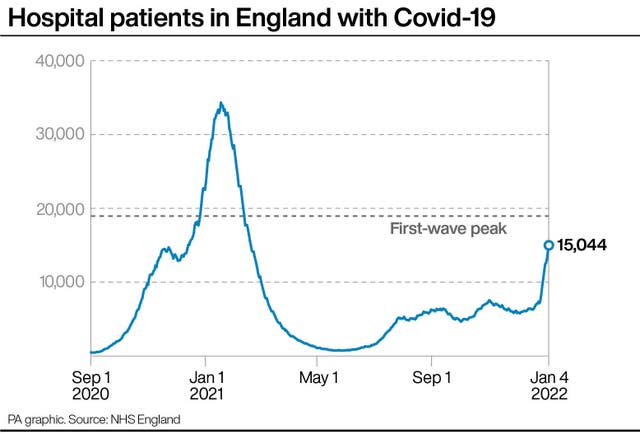
It may be too late to introduce any new Covid restrictions that would have a meaningful impact, an expert has suggested.
Dr Mike Tildesley, from the University of Warwick and a member of the Scientific Pandemic Influenza Modelling group (Spi-M), told BBC Breakfast that imposing restrictions was always better when done earlier but had to be weighed up against the effect they have on society.
“It does look like we may be in a situation where – we’re getting cases very, very high – but there’s early evidence that things might be turning around in London,” he said.
“The problem, of course, is that if you’re thinking about introducing controls, once you’re beyond the peak of the infection, then that has much less effect.

“So, our modelling work that was done before Christmas did suggest that early interventions would have had some impact in reducing the number of cases and reducing the pressure on hospitals, but at this point, talking in the early new year when we’re starting to see things turn around, the impact of any interventions being introduced now would be that much less effective.”
Dr Tildesley would not agree to saying it was definitely too late for restrictions, adding it was unclear the epidemic had peaked.
“The next few days will be really, really key for us to try to identify that – children are going back to school, we’ve had sort of differences in mixing patterns over the Christmas period and we are yet to see what happens in the data as a result of that,” he said.
“The next week or two we’ll have a real indication as to whether we really have peaked and things are starting to turn around, then we’ll have much more information as to what the effectiveness of interventions may or may not have been at this point.”
Dr Tildesley said “it is really important that in the longer term we do need to think about living with the virus”, adding: “We can’t be having a conversation in two years time about putting in lockdown to deal with whatever might be circulating.
“We do need to get more into the mindset of how are we going to manage living with the virus and continuing with our lives.
“Now, the Omicron variant when it emerged of course it was a real concern because it’s very transmissible, which obviously is a huge worry, but much less severe than the Delta variant, and if that is the pattern that we will see in the future, then hopefully we will be more into a situation of Covid circulating endemically in the UK, hopefully much milder, and maybe we have to have vaccination campaigns to protect the vulnerable similar to what we have to do with flu every winter, but we can do this without any restrictions.
“I don’t think we’re quite there yet, but hopefully once we get beyond this winter wave we can start to think more like that as we move further into 2022.”
He said the current picture on where the UK was in the Omicron wave differed according to the regions.
He said London was starting to turn around but places like the Midlands were seeing rising hospital admissions.


Comments: Our rules
We want our comments to be a lively and valuable part of our community - a place where readers can debate and engage with the most important local issues. The ability to comment on our stories is a privilege, not a right, however, and that privilege may be withdrawn if it is abused or misused.
Please report any comments that break our rules.
Read the rules here